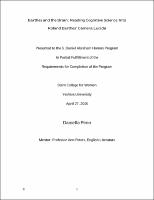Please use this identifier to cite or link to this item:
https://hdl.handle.net/20.500.12202/4055| Title: | Barthes and the Brain: Reading Cognitive Science Into Roland Barthes’ Camera Lucida |
| Authors: | Penn, Daniella |
| Keywords: | Barthes, Roland. Chambre claire --Criticism and interpretation. Visual perception. Cognition. Neurosciences. |
| Issue Date: | Apr-2015 |
| Publisher: | Stern College for Women |
| Abstract: | Camera Lucida by Roland Barthes seems at first glance to be a book about photography. It is often classified by critics and reviewers alongside other books about photography, its subtitle is “Reflections on Photography,” and the book is filled with reproduced photographs accompanied by discussion about them. Despite all of this, labeling Camera Lucida purely as a book of photography theory is misleading. It is true that Barthes begins his venture with the declaration of purpose, “I wanted to learn at all costs what Photography was ‘in itself,’ by what essential feature it was to be distinguished from the community of images” (3). But after embarking on this initially straightforward inquiry, Barthes finds his efforts stymied. The source of his dilemma, he says, is that all methods traditionally available for the scrutiny of the arts—sociology, phenomenology, technical criticism, historical criticism—seem, somehow, to miss the point. They lead him only to “ultimate dissatisfaction” (8). |
| Description: | The file is restricted for YU community access only. |
| URI: | https://hdl.handle.net/20.500.12202/4055 https://ezproxy.yu.edu/login?url=https://repository.yu.edu/handle/20.500.12202/4055 |
| Appears in Collections: | S. Daniel Abraham Honors Student Theses |
Files in This Item:
| File | Description | Size | Format | |
|---|---|---|---|---|
| Daniella-Penn.pdf Restricted Access | 155.02 kB | Adobe PDF |  View/Open |
This item is licensed under a Creative Commons License

